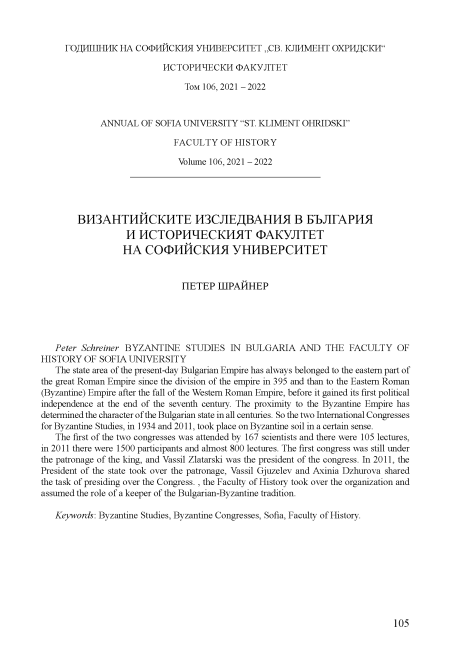Byzantine Studies in Bulgaria and the Faculty of History of Sofia University
DOI:
https://doi.org/10.60053/GSU.IF.1.106.105-110Keywords:
Byzantine Studies, Byzantine Congresses, Sofia, Faculty of HistoryAbstract
The state area of the present-day Bulgarian Empire has always belonged to the eastern part of the great Roman Empire since the division of the empire in 395 and than to the Eastern Roman (Byzantine) Empire after the fall of the Western Roman Empire, before it gained its first political independence at the end of the seventh century. The proximity to the Byzantine Empire has determined the character of the Bulgarian state in all centuries. So the two International Congresses for Byzantine Studies, in 1934 and 2011, took place on Byzantine soil in a certain sense. The first of the two congresses was attended by 167 scientists and there were 105 lectures, in 2011 there were 1500 participants and almost 800 lectures. The first congress was still under the patronage of the king, and Vassil Zlatarski was the president of the congress. In 2011, the President of the state took over the patronage, Vassil Gjuzelev and Axinia Dzhurova shared the task of presiding over the Congress. , the Faculty of History took over the organization and assumed the role of a keeper of the Bulgarian-Byzantine tradition.
References
Акти, издадени в: Известия на Българския археологически институт 9 (1935) и 10 (1936).
Tapkova-Zaimova, Vasilka. Entre deux congres. In: Proceedings of the 22nd International Congress of Byzantine Studies. Т. I. Sofia, 2011, рр. 38–65.
Akti, izdadeni v: Izvestia na Balgarskia arheologicheski institut 9 (1935) i 10 (1936).

Downloads
Published
How to Cite
Issue
Section
Categories
License
Copyright (c) 2023 Петер Шрайнер; Галина Фингарова

This work is licensed under a Creative Commons Attribution 4.0 International License.
Annual of Sofia University "St. Kliment Ohridski" - Faculty of History (GSU-IF).







